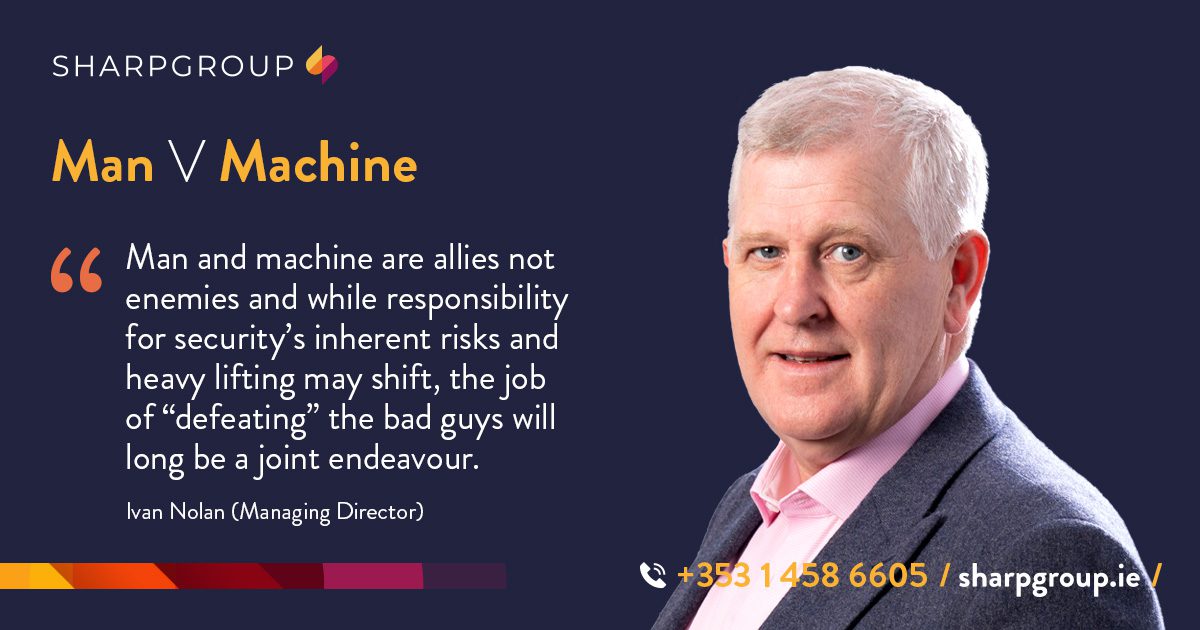Ivan Nolan, managing director of the Sharp Group – the largest Irish-owned fire and security protection provider – considers whether automation technology is set to steal a march on traditional security techniques
While patrolling the perimeter fence of a data centre or pharmaceutical laboratory is far removed from the bombs and bullets of armed conflict, strong hints as to the future of the security sector can be found in the boot marks of those tasked with enforcing peace and promoting stability in the world’s trouble spots.
No matter their uniform or the flag they fight under, today’s military “guards” perform tasks with an increasingly sophisticated arsenal and are equipped with an array of hi-tech kit that has been honed to lift some of the physical burden – and risk – from their shoulders.
Modern history is rich with examples of how war has pioneered and accelerated the development of technologies that went on to inspire best-selling products and cutting-edge commercial applications and it is a trend that shows no sign of abating.
Thermal imaging, radar and LCD screens all carry the fingerprints of military scientists and, more recently, operations in Iraq and Afghanistan proved the catalyst for a rapid evolution in the capabilities of surveillance drones.
And with war once again raging in mainland Europe, the embrace of automation by armies is strengthening.
For example, a quick recce of international headlines reveals the UK is examining how machines might reduce the need for soldiers to risk life and limb to deliver ammunition, clothes food and fuel; that a major South Korean defence company has launched a drive to develop a multi-legged counter-terrorism robot which is expected to be commercialised within two years; and how academia and robotics experts are joining forces Down Under in a bid to arm Australian soldiers with the ability to direct mechanised troops with hand gestures.
It is, therefore, not a huge leap of faith to suggest that the commercial security sector will ultimately reap the rewards of such research and rigorous field testing.
After all, ours is an industry that already places heavy trust in computer technology to complement human vigilance.
Deploying CCTV systems to safeguard sites has long been commonplace and the capabilities afforded by cameras continue to evolve, with the advent of internet protocol devices, video analytics and automatic number plate recognition all lightening the load on security officers.
Similarly, intruder alarms have transformed at a rapid rate and now comprise all-seeing detection devices that are ever ready to provide audible and visual prompts to their installers in the event of a breach or fault.
Physical access to campuses and buildings can also be entrusted to automation, with PIN codes, key fobs, swipe cards and Artificial Intelligence ID among the options available to track and control the entry and exit of occupiers and visitors.
And even non-static security taskings – the safeguarding of people and possessions while on the move – can be committed to computing, with cutting-edge mobile monitoring systems combining mapping and tracking tools, integrated panic button alarms and predetermined alarm triggers to deliver unprecedented situational awareness and peace of mind at the point of need.
If the technological present is impressive, the future will undoubtedly be even more so, which is an exciting prospect but one that might set alarm bells ringing for those set on a career in manned security.
Indeed, given the direction of travel, it certainly would not be absurd to proffer the view that traditional security techniques, such as the use of humans as sentries, could face the threat of obsoletion within a decade.
The case for computers rather than uniformed staff is likely to look even more compelling as breakthrough technologies become more readily available and fall in price – as is the enduring trend. People, in contrast, are likely to become increasingly expensive assets and, in Ireland in particular, are already difficult to recruit.
Furthermore, responsiveness will forever be a critical factor in the field of security and microprocessors have a clear competitive edge over the eyeball and brain.
Throw in the undeniable fact that to err is human and a greater dependency on digital does seem an inevitability.
I, however, firmly believe that the next chapter of security will not be exclusively electronic. Man and machine are allies not enemies and while responsibility for security’s inherent risks and heavy lifting may shift, the job of “defeating” the bad guys will long be a joint endeavour.
For the same reasons that Russian and Ukrainian drones do not fly sorties – and fire missiles – solo, there is a bombproof case for retaining humans in the loop.
A security officer might not find themselves on the proverbial front line in ten years’ time, but their experience and judgement will be integral to operations; be it in defining doctrine or determining the rules of engagement.
